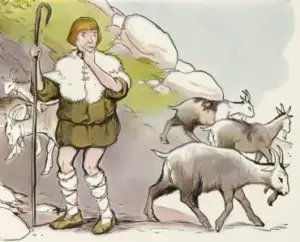A goatherd put his Goats with wild Goats and prized the wild and so fed them better than his hoping they would stay. They did not and his Goats suffered.
Old friends should not be sacrificed for new ones.
A Goatherd found some Wild Goats mingled in his herd and allowed them to stay in the fold. When it snowed the next day the Wild Goats were allowed to stay and when the herd was fed the Goatherd fed them better than the rest thinking that if he did so they might want to stay and his herd would increase. Upon the thaw, however, the Wild Goats scampered away once the herd was released. The Goatherd scolded them for their ingratitude. One of the Wild Goats responded: “Because you treated us better than the Goats you have had so long, it is plain that you would prefer any who followed better than ourselves.”

Aesop For Children
One cold stormy day a Goatherd drove his Goats for shelter into a cave, where a number of Wild Goats had also found their way. The Shepherd wanted to make the Wild Goats part of his flock; so he fed them well. But to his own flock, he gave only just enough food to keep them alive. When the weather cleared, and the Shepherd led the Goats out to feed, the Wild Goats scampered off to the hills.
“Is that the thanks I get for feeding you and treating you so well?” complained the Shepherd.
“Do not expect us to join your flock,” replied one of the Wild Goats. “We know how you would treat us later on, if some strangers should come as we did.”
Moral
It is unwise to treat old friends badly for the sake of new ones.

Townsend version
A Goatherd, driving his flock from their pasture at eventide, found some Wild Goats mingled among them, and shut them up together with his own for the night. The next day it snowed very hard, so that he could not take the herd to their usual feeding places, but was obliged to keep them in the fold. He gave his own goats just sufficient food to keep them alive, but fed the strangers more abundantly in the hope of enticing them to stay with him and of making them his own. When the thaw set in, he led them all out to feed, and the Wild Goats scampered away as fast as they could to the mountains. The Goatherd scolded them for their ingratitude in leaving him, when during the storm he had taken more care of them than of his own herd. One of them, turning about, said to him: “That is the very reason why we are so cautious; for if you yesterday treated us better than the Goats you have had so long, it is plain also that if others came after us, you would in the same manner prefer them to ourselves.”
Moral
Old friends cannot with impunity be sacrificed for new ones.
[Note: The following is a very similar story with the same moral but a little different outcome. These still go together despite the ending.]

JBR Collection
During a snowstorm in the depth of winter, a Goatherd drove his Goats for shelter to a large cavern in a rock. It happened that some Wild Goats had already taken refuge there. The Man was so struck by the size and look of these Goats, and with their superior beauty to his own, that he gave to them alone all the food he could collect. The storm lasted many days, and the Tame Goats, being entirely without food, died of starvation. As soon as the sun shone again, the strangers ran off, and made the best of their way to their native wilds. The Goatherd had to go goatless home, and was well laughed at by all for his folly.

Caprae Silvestres et Caprarius
In desertam speluncam caprarius, hieme deductis capris, silvestres inibi capras reperit hircosque, longe plures et grandiores illis quos habebat. Propriis ergo propter silvestres capris dimissis, illas frondibus educavit. Ubi vero serenitas advenit, proprias quidem demortuas fame reperit, silvestres vero in montem effugere. At caprarius, ridens, domum vacuus reversus est.
Moral
Non decet ullo modo nos propria negligere spe lucri ex alienis rebus futuri.
Perry #006
